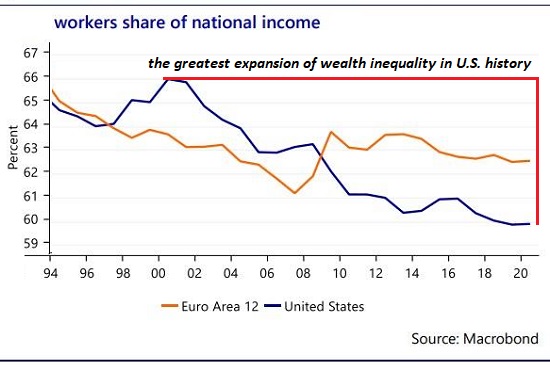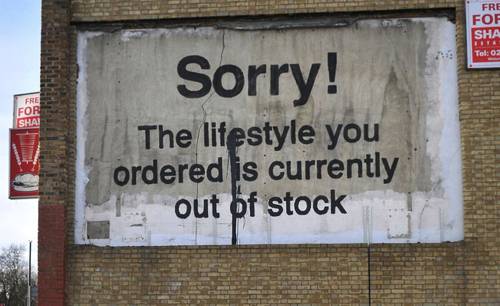Intro image by MichaelGaida from Pixabay
While the Federal Reserve and the Billionaire Class push the stock market to new highs to promote a false facade of prosperity, everyday life will fall apart.
How will the status quo collapse? An open conflict--a civil war, an insurrection, a coup--appeals to our affection for drama, but the more likely reality is a decidedly undramatic dissolution in which all the elements of our way of life we reckoned were solid and permanent simply melt into air, to borrow Marx's trenchant phrase.
In other words, Rome won't be sacked by Barbarians, or ignite in an insurrectionary conflagration--everything will simply stop working as those burdened with the impossible task of keeping a failed system glued together simply walk away.
If we examine the collapse of the Soviet Union and the Western Roman Empire, we can trace the eventual collapse to the sudden psychological shift from an assumption of permanence that found expression in denial (Rome can't fall, it's eternal...) or in the universal belief that life was unchanging and so everything was forever.
This psychological state was replaced by a shocked awareness that what was unimaginable, "impossible"--systemic collapse--was not only entirely possible, it was happening in real time. This change in consciousness arose in individuals in differing ways and velocities, but eventually everyone accepted that some adaptation was now necessary.
Correspondent R.J. and I have been discussing the consequences of the sharp decline in the value of labor which is painfully obvious in the chart below and the many other charts depicting the declining purchasing power of wages and the skimming of the majority of the economic gains by the top 0.1%.
In effect, it no longer pays to work beyond the bare minimum needed to survive as all the value generated by labor above this minimum is either skimmed by the Bezos, Buffetts, Gates, Zuckerbergs et al. or it's paid in higher taxes to the government.
If collecting bread and circuses from the state is an option, then foregoing formal work entirely offers a better lifestyle than those afforded the working poor.
While the working poor are crushed by the stresses of low wages, plummeting purchasing power, long commutes and poor working conditions, a consequential slice of the highly paid professional class is crushed by taxes and the stresses of limitless liability, bureaucracy and work.

When physicians, nurses, managers, et al. stop showing up for work, the system breaks down very quickly. Not showing up can take a number of forms: early retirement, sick leave, a demand to work halftime, a workers compensation stress leave, and of course, resignation/quitting.
As in take this job and shove it. Maybe you remember the old Johnny Paycheck tune? Let me refresh your memory: take this job and shove it, I ain't working here no more. I'm stepping off the rat race merry-go-round, thank you very much. You can find some other sucker to do your dirty work and BS work, all for the greater glory and wealth of your New Nobility shareholders. I'm outta here. So I won't get rich, that dream died a long time ago. What I'm interested in now is getting my life back and getting the heck out of Dodge as things fall apart.
The Aristocrats skimming all the gains are confident that the endless appeals of consumer-paradise consumption will keep the workforce chained to the wheel forever. This confidence reflects the disconnect of the skimming owners of debt/finance from the workforce toiling beneath them.
This is the systemic price of stripping the value of labor to the bone via globalization and financialization, the tireless engines of soaring inequality. The beasts of burden don't rebel, they just no longer show up. They slip noiselessly into the cracks and crevasses and once they're gone, there's nobody left to replace them.

As the Vital Few 4% realize the system no longer works for them and opt out, this will have an outsized effect on the 64%, most likely urban dwellers highly dependent on increasingly brittle, fragile services that depend on the Vital Few for their functionality.
Ideology won't matter. Those dropping out may be Conservative or Progressive or they may have lost interest entirely in politics and all the other circuses that serve to distract the populace from the crises dissolving the glue that held the system together.
While the Federal Reserve and the Billionaire Class push the stock market to new highs to promote a false facade of prosperity, everyday life will fall apart. The New Nobility's primary characteristics are infinite greed and near-infinite hubris, and so they will wrongly assume that the professional and working classes they need to keep slaving away for wages that are losing purchasing power are as greedy and blind as themselves.
But those in the trenches aren't as blind as those out of touch at the top. They will see that their job is no longer tenable and their sacrifice won't be enough nor will be it be valued, so they will figure out how to leave.
The police will stop showing up, the hospital will be half-staffed, the garbage collection crews thin out, gasoline deliveries won't be made and so on. Those at the top will claim it's still whole (look, stocks are soaring!) but functionality will have dissipated like mist in Death Valley.
The most competent will realise the impossibility of keeping it glued together and so they will exit first. The most noble will try to keep it going but they will burn out and drop away, leaving the incompetent to oversee the final collapse.
All That Is Solid Melts Into Air and the lifestyle you ordered is permanently out of stock.
source books:
Everything Was Forever, Until It Was No More: The Last Soviet Generation (recommended by Mark J.)
The Fall of the Roman Empire: A Reappraisal (1976, Michael Grant)
The Fall of the Roman Empire (shorter version, 1990, Michael Grant)
Author
Charles Hugh Smith is a contributing editor to PeakProsperity.com and the proprietor of the popular blog OfTwoMinds.com. He is the author of numerous books, including Why Everything Is Falling Apart: An Unconventional Guide To Investing In Troubled Times.





